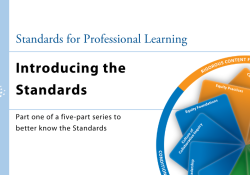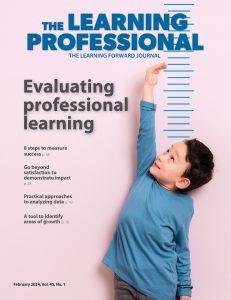Why are windshields larger than rearview mirrors? Windshields are larger than rearview mirrors so that we may focus on the road ahead while occasionally looking behind for perspective and course corrections.
In a similar fashion, New Year’s resolutions allow educators to reflect on possibilities and opportunities. My resolution for 2015 is to learn more about the topics that will help us make sense of the continuously shifting educational landscape so that we can focus on next steps for student success.
My hope as a Learning Forward coach and blogger is that you will join me on this journey of learning more about these six topics in 2015.
- Managing multiple new programs and initiativesManaging multiple new educational programs and initiatives requires detangling to make meaning. Understanding what is mandated, what is duplicative, and what is aligned is essential to taking the next steps.The shadow cast by new mandates and initiatives seems daunting at times. Shining a light on initiatives and untangling them clarifies their connectedness.
- Teacher evaluation and the link to powerful professional learning
We know that for deeper learning to occur, systems must be in place that promote collaborative atmospheres in which educators have frequent opportunities to discuss teaching and learning, expert voices inform the dialogue, and learning teams have opportunities to engage in conversations about improving instructional practice and student achievement.My goal is to have a better understanding of teacher evaluation policies and practices that assess educator performance as well as comprehensive systems of continuous improvement that support educator learning. When educators understand teacher evaluation policies, this knowledge will positively impact their practice and student learning. - Feedback: Utilizing the power of words
Building a culture of trust where educators are skilled at giving and receiving feedback builds collective collegiality and is the first step toward effective educator evaluation systems. Feedback is the beginning of a conversation that leads to improved instructional practice. Feedback is also an integral link to conversations about teacher evaluation.Effective feedback is built on carefully chosen words. Words can offer perspective, insight, and understanding. Words can bring encouragement and hope. Words can take away fear and isolation. Words can reconcile and unite. When words become actionable in our own lives and the lives of others, we can change our thinking and our practice. - Rethinking assessment practices – Technology innovations
The assessment focus is shifting to tools and approaches that promote authentic, ongoing measurement, provide relevant feedback, and help inform personalized instructional practices.Emerging technologies hold the promise of enhancing learning assessment. I have some questions to explore about these technologies including:- What tools, applications and skills, are needed to support K-12 assessment practices?
- How can real-time assessment provide a more personalized/individualized learning environment?
- What supports are needed to sustain these environments?
- What are the benefits/challenges of online assessment?
- How does the use of technology influence assessment ethics for both students and school districts?
- How is digital content changing education?
- PLCs – The promise versus current practice
One unexpected and disquieting finding in the recently released report from the Bill & Melinda Gates Foundation, Teachers Know Best: Teachers’ Views on Professional Development, concerned teachers’ dissatisfaction with PLCs. Since we know that teachers consistently endorse the merits of collaborative learning, the finding of teacher dissatisfaction with PLCs has implications for our work.The implications may be related more to the implementation of learning communities than the actual PLC structure or learning design. Some questions raised by the findings report include:- How to implement learning communities that promote personalized support?
- How to assure expert voices and skilled facilitators are part of learning communities?
- How learning communities operate with a commitment to the norms of continuous improvement?
- How to ensure learning communities have measurable learning goals for educators and students based on achievement data?
- Participate in the Learning Forward Annual Conference
My final resolution is to commit to participating in the Learning Forward Annual conference. Over 10 years ago I attended my first annual conference. At the time I thought I understood professional development. What I learned was how much more there was to learn.At the close of the last Learning Forward conference, I committed to learning more about professional development, sharing what I learned, and attending every conference. All of that and more has come to pass by being open to new ideas, putting them into practice, sharing lessons learned, and developing a network of professionals from whom I continue to learn. So the annual conference is much more than an event. It is more like an idea incubator that fosters growth, change, and risk-taking.
Now that I’ve shared my six New Year’s resolutions …
- Managing multiple new programs and initiatives
- Teacher evaluation and the link to powerful professional learning
- Feedback and the power of words
- Rethinking assessment practices — technology innovations
- PLCs — The promise versus current practice
- Commit to the Learning Forward Annual Conference
… consider how these topics align with your professional goals, and the implications they have for your work.
During 2015, we will explore these topics together, mainly looking through the windshield and occasionally through the rear view mirror. I hope you will join me on this learning journey.






